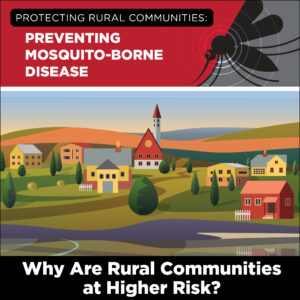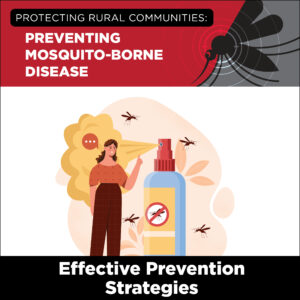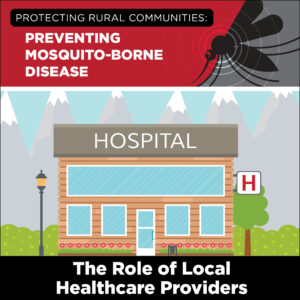In rural areas, nature is part of everyday life—and while that brings beauty and tranquility, it also brings some seasonal concerns, like mosquitoes. During warmer months, it’s especially important to be aware of mosquito-borne illnesses and how to prevent them.
With the right knowledge and a few simple precautions, you can help protect yourself, your family, and your community—and your local hospital is here to support you every step of the way.
 What Are Mosquito-Borne Illnesses?
What Are Mosquito-Borne Illnesses?
Mosquito-borne illnesses are conditions spread through the bites of infected mosquitoes. Some of the most common include:
- Dengue Fever – Can cause fever, headaches, joint pain, and rash.
- Malaria – Symptoms may include fever, chills, and flu-like effects. Malaria can become serious without quick treatment.
- Chikungunya – Similar to dengue, often with fever and lingering joint pain.
- Zika Virus – Mild in most cases but can be serious for pregnant women, as it may affect unborn babies.
These illnesses are most commonly spread by mosquitoes that thrive in warm temperatures and areas with standing water.
 Why Rural Communities Should Stay Informed
Why Rural Communities Should Stay Informed
Rural communities face unique environmental factors that can contribute to a higher risk of mosquito activity:
- Standing Water – Natural water sources, farm irrigation, and rainwater can create breeding grounds.
- Longer Travel Times to Care – Getting to a doctor may take longer in rural areas, but local hospitals like ours offer care that’s close to home.
- Lower Awareness – Some people may not be familiar with the symptoms or how to prevent mosquito-borne illness.
- Limited Infrastructure – Fewer resources for drainage and sanitation can mean more places for mosquitoes to breed.
The good news is, many of these challenges can be managed with community support and everyday prevention.
 Simple Ways to Stay Protected
Simple Ways to Stay Protected
You don’t have to go far or make big changes to lower your risk. Here’s what you can do right at home:
- Get Rid of Standing Water
Dump out water in flowerpots, buckets, tires, and gutters. Check regularly after it rains. - Dress for Protection
Wear long sleeves and pants, especially at dawn and dusk when mosquitoes are most active. Insect repellent with DEET or picaridin can also help. - Use Barriers at Home
Make sure windows and doors have screens, and consider using bed nets, especially for young children or pregnant women. - Stay Informed
Watch for symptoms like fever, rash, and joint pain, and help spread the word in your community about how to prevent illness. - See a Doctor if You’re Not Feeling Well
Early care makes a big difference. If you feel unwell, your local healthcare team is here to help you get the treatment you need.
 Your Local Hospital: A Partner in Prevention
Your Local Hospital: A Partner in Prevention
Your hometown hospital is more than a place to go when you’re sick—it’s also your partner in keeping the community healthy. We’re here to:
- Provide fast, effective care
- Help you understand symptoms and risks
- Share information about prevention
- Work with public health teams to track and reduce disease spread
Working Together to Stay Healthy
Mosquito-borne illnesses can be serious, but with awareness, simple prevention habits, and support from your local healthcare providers, we can greatly reduce their impact.
By taking small steps—like dumping standing water and using repellent—you’re doing something big for your health and your community. And remember, your local hospital is always here, ready to help and keep care close to home.


 Why Rural Communities Should Stay Informed
Why Rural Communities Should Stay Informed Simple Ways to Stay Protected
Simple Ways to Stay Protected Your Local Hospital: A Partner in Prevention
Your Local Hospital: A Partner in Prevention

